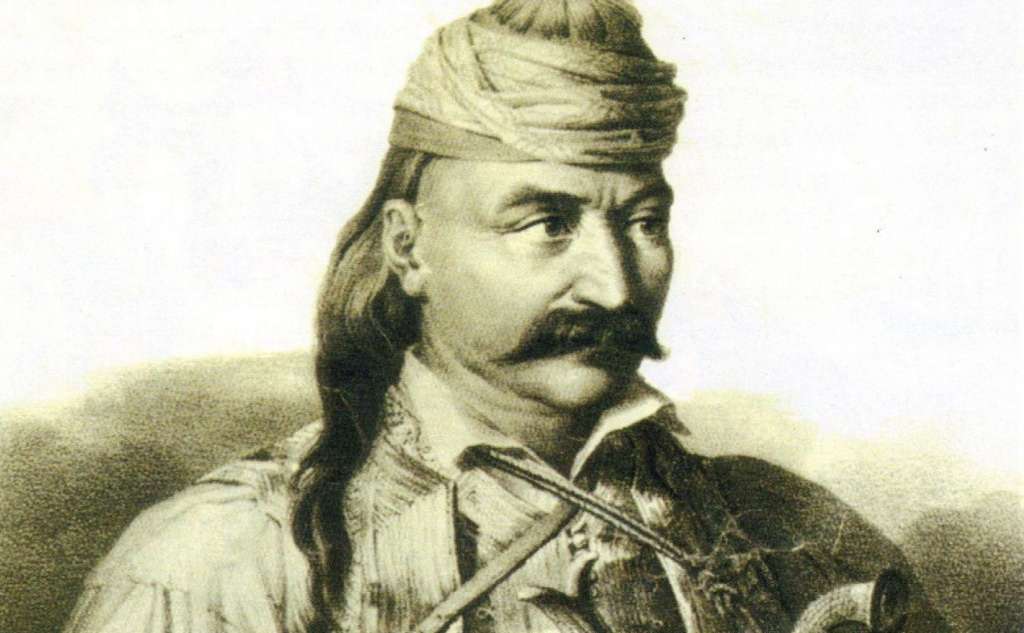Theodoros Kolokotronis - Hero of the Revolution of 1821

THE OLD MAN OF MORIA
Theodoros Kolokotronis was born in Ramovouni, Messinia, on April 3rd, 1770. He was a great commander, chieftain, advisor to the State and, undoubtedly, the leading figure of the Greek Revolution of 1821. His surname was originally Tzerginis as it is mentioned in his “Memoirs”. He spent his childhood in Alonistaina, Arcadia, where his mother Zambia Kotsakis came from. His father, Konstantis Kolokotronis, took part in the Orlophic uprising and was killed along with his two brothers by the Turks in 1780. At the age of only 15, Theodore Kolokotronis became an armor bearer against the thieves of the Leontari region.
In 1790, at the age of 20, he married Catherine Karoutsou (daughter of an Akopos ealdorman, Dimitrios Karoutsos), and together they had four children. Kolokotronis had another son, Panos Kolokotronis, whom he had out of wedlock with Margarita Velissari, and whom he recognized in his will.
In 1805, he took part in the naval operations of the Russian fleet during the Russian-Turkish war. In January 1806, a decree of his persecution was issued. Eventually, he managed to escape by boat, leaving from the area west of the Laconian gulf and passing to the Russian-occupied Kythera. From 1810, he served in the Greek military forces of the English Army in Zakynthos, reaching the rank of Major. In 1818, he was initiated into the Filiki Etaireia (Friends Society), and in January 1821 returned to Mani for the preparation of the Revolution. He was found in Kalamata during the bloodless occupation of the city on March 23rd, 1821, and the next day he went to Megalopolis with Nikitaras. On March 25th, they were in the plains of Karytaina or Megalopolis, the day on which the Revolution was declared.
Although almost illiterate, Theodore Kolokotronis knew the history of his people quite well. He ‘starred’ in many military operations, such as the victory at Valtetsi (13th May 1821), the fall of Tripolitsa (23rd September 1821) and the destruction of Dramalis at Dervenakia (26th July 1822). With these successes he became commander-in-chief of the Peloponnese. During the Civil War (1823-1825), he and his son were arrested and imprisoned in Nafplio. In 1825, Ibrahim came to the Peloponnese and it was then when Kolokotronis was released to confront him along with Petrobey Mavromichalis.
He was a fervent supporter of the Kapodistrias' policy and led the events for the enthronement of Otto. In 1833, his disagreements with the Regency led him back to the Akronafplia prisons in Nafplio under the charge of treason. So, on May 25th, 1834, he, along with Plaputas, was sentenced to death. After being given special favour in 1835 after Otto's adulthood, he was appointed Adviser to the State, honored with the rank of general and appointed a member of the committee for the construction of the University of Athens. In the last years of his life, he dictated his "Memoirs" to the historian George Tertsettis which were published in 1851 under the title: "Telling the events of the Greek race from 1770 to 1836". One of Theodoros Kolokotronis' most famous quotes is: "God has signed the freedom of Greece and will not take his signature back."
In the end, Kolokotronis lived in Athens with his mistress Margarita Velissaris (his wife had died in 1820) in his privately owned home, at the corner of present-day Kolokotronis and Lekkas streets. He died on February 4th, 1843, at the age of 73, from a stroke, having returned from a feast to the basicic Palaces as a defender of Otto. He was buried with every solemnity at the First Athens Cemetery. On October 10th, 1930, his bones were transported from Athens to Tripolis and were placed in a shrine, which, since 1970, has been put in a special cache in his statue.



